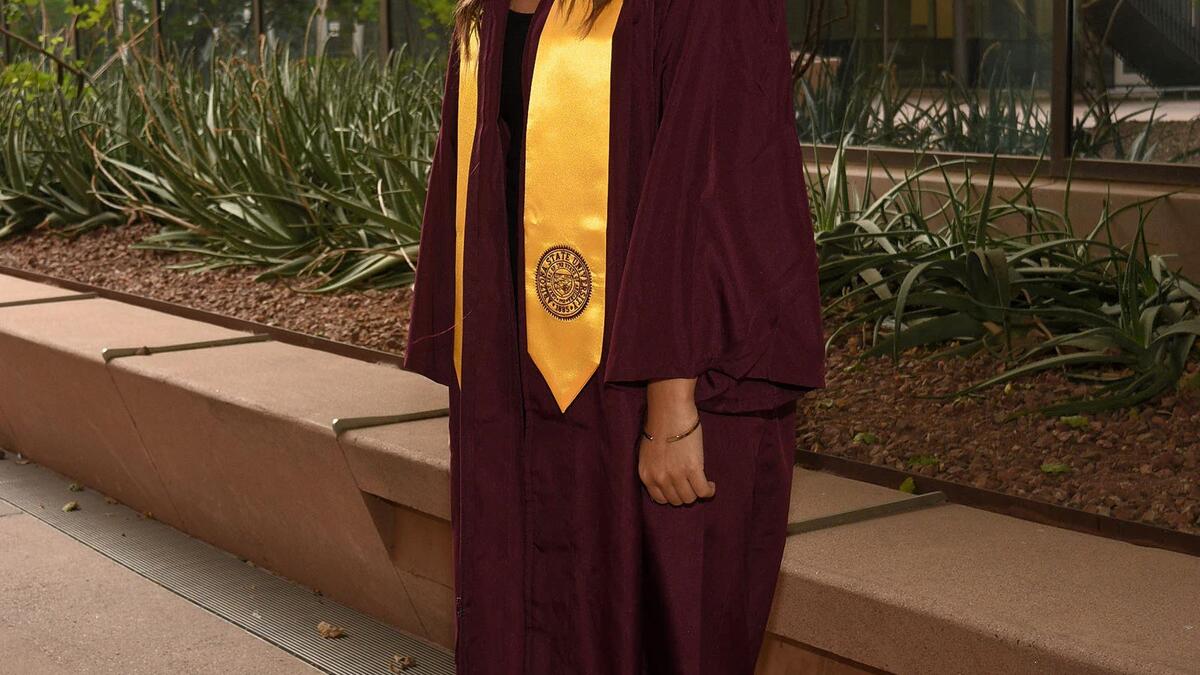ASU honors graduate Sarah Lopez aspires to be a doctor specializing in women’s health

Sarah Lopez aspires to be a physician specializing in women's health. She is graduating this month with a bachelor’s degree in medical studies, with a minor in Spanish and honors from Barrett, The Honors College at ASU.
Editor's note: This story is part of a series of profiles of notable fall 2021 graduates.
Sarah Lopez counts completing her honors thesis among her proudest moments as an honors student at Arizona State University.
Lopez is graduating this month with a bachelor’s degree in medical studies, with a minor in Spanish and honors from Barrett, The Honors College at ASU.
“Looking back at my time at ASU, I am most proud of completing my thesis project which I titled 'No Mother Left Behind: An Investigation of Three Disparities that Plague Black Mothers in America.' The thesis process was incredibly challenging and rewarding for me, and ultimately, I am so proud of the final result,” she said.
“I am so glad that I got to shed some light on the challenges faced by this community and continue the push for health equity, a goal that is incredibly important to me.”
While a student, Lopez interned with St. Vincent de Paul in its medical clinic. She’ll continue in the job after graduation.
“I will be working as a scribe and a translator to help provide care to the underserved families in our community. I plan to apply to medical school this spring and hope to be admitted for the 2023 school year. While I still have plenty of time to think about a future specialty, I would love to continue the work I started with my honors thesis and pursue a career that focuses on women's health,” she said.
We caught up with Lopez as she prepared for graduation to get her thoughts on her ASU experience.
Question: What was your “aha” moment when you realized you wanted to study the field you majored in?
Answer: I've known that I wanted to pursue a career in medicine since I was 10 years old! So many people in my family and in my community have a distrust for health care workers, whether it be due to a language barrier or perceived discrimination. Since that time, I've wanted to become that safe place that I feel is missing for so many people. I've chosen to continue studying Spanish and completing a minor in that field so that I can reach even more people.
Q: What’s something you learned while at ASU — in the classroom or otherwise — that surprised you or changed your perspective?
A: I grew up in a fairly suburban town outside of Milwaukee (Waukesha, Wisconsin), so moving to the ASU Downtown campus in Phoenix was definitely a big change for me. At first, I wasn't sure if I would fit in, but I've loved living in such a diverse and fast-paced community. One thing that I've learned while attending ASU is that we are all a lot more similar than I previously thought; it is so much easier to find commonalities than differences. ASU really allows students to branch out of their comfort zone and celebrate individuality.
Q: Why did you choose ASU?
A: I chose ASU because I truly felt that it would provide me with the most opportunities to prepare for a career in health care and connect with the Latinx community. Being invited to be a Barrett student was an incredible opportunity and was another huge factor in my decision to attend ASU. Seeing the way ASU supports the Latinx community through student scholarships and so many amazing internship programs was something very important to me.
Q: Which professor taught you the most important lesson while at ASU?
A: The professor that taught me the most important lesson while at ASU would definitely be Dr. Alex Trimble Young, an honors faculty fellow. As I'm sure most students can relate, the pandemic took a huge toll on me both personally and academically. As my senior year approached, I was honestly ready to quit. But with the help of Dr. Young and some amazing advisers, I made it through. I learned to persevere and problem-solve, especially during the tough times.
Q: What’s the best piece of advice you’d give to those still in school?
A: If I could give one piece of advice to those who are still in school, it would be this: Don't be afraid to ask for help! No one has it together all the time, not even the mentors and professors we admire so much. The ability to candidly and graciously ask for help is a strength, not a weakness. (One that I am still working on). ASU has so many great resources, and they are there for a reason, so don't be afraid to lean on them.
Q: What was your favorite spot on campus, whether for studying, meeting friends or just thinking about life?
A: My favorite spot on campus is definitely the rooftop of the Sun Devil Fitness Center. I always feel more productive when I work and study outside, and there's no better place in downtown Phoenix. I always loved studying in a hammock and looking out over the city.
Q: If someone gave you $40 million to solve one problem on our planet, what would you tackle?
A: Working as an intern and a volunteer for St. Vincent de Paul has really opened my eyes to the needs of the homeless and underserved in our community. If someone gave me $40 million, I would want to put that money towards building more housing for this vulnerable population. I would also love to fund development opportunities which would help to reintegrate this population into the community, into the workforce and into long-term personal and financial stability. Anything from mental health services to job interview preparation could be incredibly beneficial and impactful. Ending homelessness in Phoenix alone is a huge task, but $40 million could really change so many lives.
More Health and medicine

College of Health Solutions launches first-of-its-kind diagnostics industry partnership to train the workforce of tomorrow
From 2007 to 2022, cytotechnology certification examinees diminished from 246 to 109 per year. With only 19 programs in the…

ASU's Roybal Center aims to give older adults experiencing cognitive decline more independence
For older people living alone and suffering from cognitive decline, life can be an unsettling and sometimes scary experience.…

Dynamic data duo advances health research
The latest health research promises futuristic treatments, from cancer vaccines to bioengineered organs for transplants…

